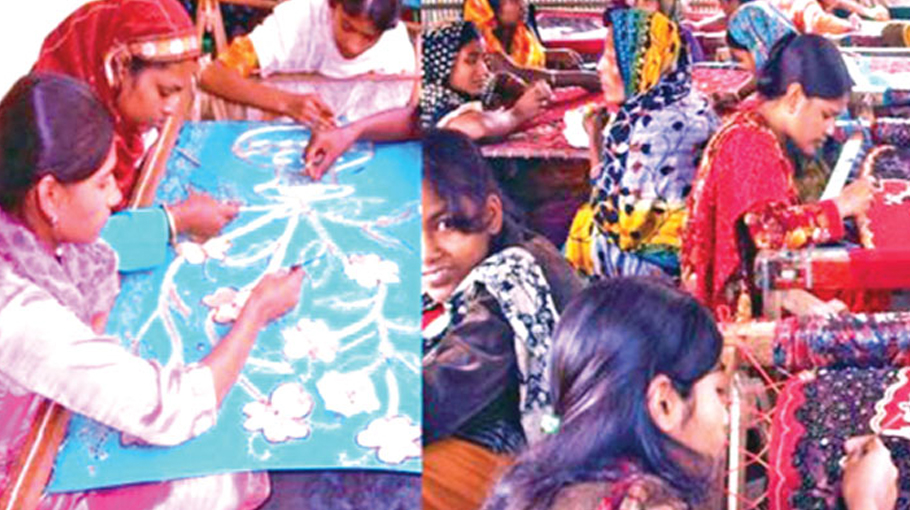Ornamental stitching artisans busy ahead of Eid fest

Many female artisans are busy with ornamental stitching to female clothes to add extra values, fashion and decency before the Eid-ul-Fitr festivity following huge demand of their handwork at sophisticated markets.
Officials, development experts and NGO executives said around 40,000 women are now busy with ornamental needlework at homes or local enterprises in Rangpur division to earn much better at this particular period of the year.
"The women are recognised as craftswomen for engagements with embroidering, spangling and ornamental stitching on saree, three pieces and other clothes," said Deputy General Manager of Bangladesh Small and Cottage
Industries Corporation (BSCIC) for Rangpur Md. Shamim Hossain.
Ornamental stitching on female clothes has become a profitable venture since before the outbreak of the Covid-19 pandemic to cut poverty bringing self-reliance to unemployed women putting huge positive impacts on the rural economy.
The BSCIC, Department of Youth Development (DYD), Bangladesh Rural
Development Board, Department of Women Affairs (DWA), Department of Social Services, other departments and NGOs are assisting to expand the sector with entrepreneurs and traders.
Deputy Director of the DYD at Rangpur Md. Abdul Khaleque said some 3,000 rural women have changed fortune through the venture with DYD assistance to lead better life with their family members in Rangpur alone.
The DYD provides required training to unemployed female youths, divorcees and distressed women on sewing and embroidery and disbursed easy-term loans and inputs to make them self-reliant.
"Such types of home-based or enterprise-based embroidery works have got the shape of a growing cottage industry creating huge jobs for unemployed female youths to cut poverty, changing the rural economy," Khaleque added. Deputy Director of the DWA for Rangpur Kawser Pervin said over 3,500 unemployed female youths are earning well in Rangpur after getting training
on sewing and embroidering and assistance from the department in the last 13 years. Talking to BSS, female entrepreneur Sanjida Lopa said she has set up 'Taimur Boutique' where 12 female youths are working as expert artisans at Dhal Lalkuthi area in Rangpur city and many of them earning up to Taka 12,000 every month per head.
"Currently, we are facing huge pressure to supply previously ordered woks on embroidering, spangling and ornamental stitching on saree, three pieces and other female clothes before the Eid-ul-Fitr festivity as in the previous years," Sanjida said. Entrepreneur Chand Mia of village Chankuthi Danga in Badarganj upazila of Rangpur said he has expanded the spangling industry generating employment for many poor rural women through turning them into expert spangling and embroidery artisans.
Craftswomen Shamima, Marjina, Sohana and Mollika said they have achieved self-reliance through ornamental needle works like other women, unemployed girls and adolescents of Chankuthi Danga village like many others in the upazila.
Successful craftswomen Anar Koli, Mahbuba, Shabana Begum, Saleha Khatun and Noorjahan of Syedpur upazila in Nilphamari said they generally earn Taka 10,000 monthly and up to Taka 20,000 through embroidery works before the Eid- ul-Fitr.
Private sector entrepreneur of 'Nari Ponno' Farida Pervin at Ulipur upazila town in Kurigram said ornamental stitching on female clothes at her enterprise has brought self-reliance to over 600 youth females of the upazila.
"The craftswomen generally earn Taka 10,000 to 18,000 per month each depending on their expertise and quality of decorating saree, three pieces and other female clothes with spangling, ornamental stitching and embroidery works," Farida added.
Chairman of Rangpur-based 'Northbengal Institute of Development Studies' Dr Syed Samsuzzaman said embroidery and spangling have got the shape of a cottage industry as rural women have launched their own enterprises to change the rural macro-economy.


